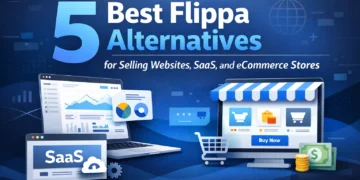Over the past few years, we’ve sold multiple ecommerce businesses and brokered the sales of many others. This means we know a bit more than most about selling online businesses. That’s why we’re writing this guide. These years of digital commerce experience will help you learn how to sell your online business for the best possible price and maximize your profit through effective listing and sales strategies.
Reasons Why People Sell Their Online Business?
When you tell people you want to sell your cash-generating online asset, such as an ecommerce store or digital platform, you might get a few raised eyebrows. “But why would you want to give that up?” The truth is, there are many reasons, including increasing profit and customer base, and it’s often a very personal decision.
The underlying reason is that you’re sitting on a large pile of cash from your online sales. An increasing number of ecommerce entrepreneurs, investors, and private equity firms are ready to spend cash to buy your digital business. Utilizing a broker can help secure the best deal and maximize your sale price.
We’ve heard many reasons since we started brokering deals on ecommerce platforms. Here are some of the most common:
- To receive a huge lump sum of capital
- Entrepreneur burnout
- To fund other projects
- To retire
- To buy a house
As people who have sold online businesses before, we understand that your ecommerce store is your baby. So try to sell for the right reasons and it will make the selling process much easier for everyone.
Can I Sell My Business on My Own?
Yes, this is what’s known as a private sale. Opting for a private sale means you’ll need to locate potential buyers yourself, possibly utilizing online platforms like Facebook or marketplaces with no regulations.
While this approach can save you from paying broker commissions and listing fees, it comes with its own set of challenges. Everything is going to be in your hands; you’ll have to do all the heavy lifting in the selling process.
This includes vetting potential buyers, communicating through sales platforms, and negotiating deal terms. You’ll need to manage the transfer of your website and digital content to the new owner. This selling process can be complex and is far too time-consuming for most people.
Another important concern is privacy. Online business owners have to be aware of copycats and competitors trying to view sensitive data and information about your ecommerce store. This sensitive information should only be revealed to serious buyers who can prove they have the capital to purchase and are prepared to sign non-compete agreements. This can be very difficult to manage in a private sale, which is why our platform offers secure listing services as standard to protect your data.
Things To Keep Readily Available Before Selling
If you’re thinking about selling your online business, now is a good time to get everything in order. These are the things that potential buyers will ask you for when listing your ecommerce store (we also have a guide on buying online businesses). Nobody wants to get caught short; it makes your listing look unprofessional.
Having these documents to hand also allows you to get the most accurate valuation for your online store. More than that, they’ll speed up the listing process on ecommerce platforms and ensure your business gets sold faster.
- Financial Records
- Profit and Loss Statements: Maintain accurate monthly records.
- Revenue Proof: Clear evidence of income and expenses.
- Separation of Accounts: Keep business and personal finances separate.
- Analytics Data
- Traffic Reports: Use tools like Google Analytics with at least six months of data. Ideally 12.
- Source Data: Track where traffic and sales are originating.
- Operational Procedures
- Standard Operating Procedures (SOPs): Detailed guides for all business processes.
- Supplier Agreements: Ensure contracts are transferable.
- Outsourcing Documentation: Clearly outline any outsourced tasks and agreements.
- Legal Documents
- Terms of Service: Current and legally sound.
- Intellectual Property: Proof of ownership for any proprietary content or technology.
- Marketing and Growth
- Marketing Strategies: Document past and current campaigns.
- Growth Opportunities: Outline potential areas for expansion.
Get the best price for your business — we take care of the rest.
Start Selling for FreeHow to Get The Best Price For Your Online Business?
Preparation is the best way to maximize your sales price when selling an online business. Most buyers on ecommerce platforms want a business with streamlined operations, robust data, and a steady or growing customer base. Having an exit plan is not just going to help you sell for more, it will also help you sell quicker.

1) Maintain Accurate Financial Records
Ensure your financial records, including profit and loss statements, are up-to-date and organized for your ecommerce store. Consider hiring an accountant or using a broker that verifies online businesses to validate these documents. Inaccurate P&Ls, even by mistake, can spook potential buyers away.
2) Outsource
Most buyers don’t want to buy a full-time job. They want an ecommerce business that has outsourced its operations to reliable services. Businesses that have outsourced operations and require low hours worked (a few hours a week) are likely to receive higher valuation multiples and command a better selling price.
3) Consistent Traffic and Revenue
Steady is safe. Ecommerce businesses with steady or steadily growing traffic and revenue are the most desirable to purchase. This consistent sales data is easier for buyers to predict. A business on an unstable platform or in a period of sharp growth or decline is more difficult because nobody knows where it will end up. Uncertainty can result in a more difficult business to value.
4) Business Age
Generally, ecommerce businesses with a longer history of earnings will receive a higher valuation multiple. This is because buyers see them as having a market fit on their platform and being more established. Or, to put it another way, less likely to fail.
5) Document Standard Operating Procedures (SOPs)
Create detailed Standard Operating Procedures (SOPs) for your ecommerce business operations. These comprehensive documents reassure buyers that the online business can run smoothly under new management.
6) Showcase Growth Potential
Highlight the future growth potential of your ecommerce business. Demonstrate opportunities for expansion through untapped online markets, new product lines, enhanced digital marketing strategies, or expanding your platform’s reach.
Note that it’s important not to make any big changes to your ecommerce platform or business in the weeks leading up to listing your business. This can put buyers off as the effect of the changes is unknown. If you already have everything ready, including accurate data and a streamlined platform, you’re in a good position to sell.
Receive an instant valuation with our Ecommerce Business Valuation Tool.
Get My ValuationFollow This Process To Sell Your Online Business
To make the sale process of your online business as smooth as possible, getting everything in order saves you time. It also makes you look more professional to potential buyers using ecommerce platforms.
Here’s a seller checklist that we use to help ecommerce sellers list their online businesses:
- Get a professional valuation and book an exit planning call. This will help you to know exactly what to do to sell.
- Organize your financials. You should already have a P&L but double check everything is correct. Find any anomalies or big changes and note what caused them. This is one of the first things buyers will ask about.
- Collate supporting documents. Make sure SOPs are created for repetitive tasks. This ensures the buyer has the information they need to run the business or hire new employees.
- Employee and supplier contracts. If you have employees, freelancers, or suppliers you’ll want to see if they’re open to working with a new owner. This means you can let the buyer know that contracts can easily be transferred.
- List your business. With all the admin work done and a valuation you’re happy with, it’s time to list your business for sale. Most sellers opt for a broker due to the ease of finding buyers. But, whatever your sales method, your business is ready.
- Manage buyer interest. Try to be responsive to buyers. There’s going to be a lot of questions and potentially offers. It’s also recommended to qualify if potential buyers are serious if you’re using a marketplace that doesn’t do it for you.
- Accept an offer. Choose the best offer for your business and be open to deal structures. Make sure that you’re covered with legally binding contracts and Escrow.
- Transfer the business. Accounts and services will need to be safely transferred from seller to buyer. If you’ve not done this before consider consulting someone with experience.
Where Can You Sell It?
Gone are the days when you’d have to find a buyer yourself. Now sellers are spoilt for choice with numerous ecommerce platforms and marketplaces like Flippa and Shopify for selling their online business. However, this brings about a new problem; which platform should you choose?
These are the main options:
- Online Marketplaces
- Industry Forums and Communities
- Social Media
- Personal Network
As owners of the ecommerce marketplace Ecomswap, we believe that a specialized marketplace is the best option for selling your online business. But, you should be careful about which marketplace platform you use. Not all marketplaces will offer the same level of services, privacy, or support for sellers.
We help sellers prepare for a sale by verifying their ecommerce financial documents, assessing valuation, and marketing their online business on our platform. This professional service comes with the security of knowing that your business is only going to be seen by verified buyers interested in ecommerce deals.
Verified buyers on our ecommerce platform are people we know have the capital and desire to purchase your online business. This means you avoid tire-kickers and those simply trying to steal ideas or sensitive content. This is something that every seller must be aware of, especially those that choose to sell privately or with an unregulated marketplace.
When Is The Best Time To Put Your Business On Sale?
There’s not one right time for everyone. The best advice we can give you is to get regular professional valuations for your ecommerce business and write down a reasonable price you’d be happy with. When your business reaches that valuation, it’s time to sell because there’s no way to “time” the online market.
Valuation multiples for ecommerce businesses do fluctuate. The online commerce market goes through highs and lows like any other market. But waiting for the market to change can cause more problems than solutions. Ecommerce businesses are volatile; there’s no guarantee that your profits will last forever.

Valuation multiples for ecommerce businesses do fluctuate. The online commerce market goes through highs and lows like any other market. But waiting for the market to change can cause more problems than solutions. Ecommerce businesses are volatile; there’s no guarantee that your profits will last forever.
Sure there are things you can do to get your ecommerce business in order. We’ve already mentioned them in this article. But, there’s no best time of the year to sell an online business. It has to be a personal decision based on your ecommerce platform and goals.
If your ecommerce business is seasonal, putting it on the market during its high season can be a good way to convince buyers to buy quickly. However, it’s not going to get you any more money as a 12-month pricing average will be used to negate the effects of seasonality.
However, we’ve also learned that stability in your ecommerce sales is better than crazy growth and personal choice is better than trying to time the online market.
How Much Time Will It Take?
Sale time for an ecommerce business is highly dependent on the individual online store. Some online businesses can take one day to accept an offer while others can take six months to sell.
To give you a clearer picture, here are some key factors that can impact the selling timeline for your ecommerce business:
- Business size: Larger businesses often have more complexities which can increase the time it takes to sell.
- Market demand: High demand for businesses in your niche can speed up the sale.
- Preparation: Properly organized financial records and documented processes help with listing and due diligence.
- Use of a broker: Hiring a business broker might quicken the process compared to handling a private sale.
- Pricing: Setting a realistic price based on your business’s value can attract buyers quicker.
Sellers must factor in the time it takes to transfer the business to the buyer. Once the offer is accepted, there will be a revenue verification process. On top of this, it can take one to two weeks to transfer details for some businesses. For example, content websites need to have all their affiliate links changed.
Our AI recommends the best listings based on your investment profile.
Discover MilesKey Takeaways
The key to selling your ecommerce business for the best price is to make it attractive to buyers on online platforms. While raising your net profit is the best way to get a higher valuation, optimizing sales and enhancing your digital presence are also crucial to effectively sell your business.
Most buyers want to purchase an ecommerce business that can be run hands-off. Purchasing something with 40 hours a week of required work can be more difficult to sell. Outsource operations where possible and avoid making any wholesale changes to your online store right before selling.
If you want to get free professional advice, reach out to our Team at Ecomswap. We would be happy to provide you with the best exit planning strategy!
FAQ
What are the key steps to prepare my online business for sale?
Key steps to prepare your online business for sale include: obtaining a professional valuation to understand its worth, setting clear sale goals, organizing thorough and accurate financial records, optimizing business operations for maximum appeal, creating a compelling marketing package, protecting sensitive information with NDAs, and preparing for post-sale transition support. Maintain consistent business performance throughout the process for best results.
How do I determine the valuation of my online business?
To determine the valuation of your online business, use methods like Seller’s Discretionary Earnings (SDE) , which multiplies average net profit by a multiple of 20-60, or EBITDA for larger businesses. Tools like Empire Flippers’ valuation calculator can also help by considering industry standards .
What documents and financial records are needed to sell an online business?
To sell an online business, prepare these key documents: profit & loss statements (last 2-3 years), current balance sheet, cash flow statements, tax returns, accounts receivable/payable, business overview, lease and insurance policies, supplier and employment contracts, confidentiality agreements, and valuation reports. Clean, organized financials build trust and validate value to buyers .
Where can I list my online business for sale, and what are the common platforms used?
You can list your online business for sale on platforms like Ecomswap, which are common and trusted marketplaces.





